- Home
- Claudia Mills
How Oliver Olson Changed the World Page 4
How Oliver Olson Changed the World Read online
Page 4
The space sleepover with the entire third grade, except for Oliver.
Oliver and Crystal finished their diorama on Saturday morning, at Crystal’s house. This time her mother took the dogs on a long walk, so nothing happened to Pluto number three. He looked cute, perched on top of the enormous carton, with his small sign crying, “Let me in!”—one little planet against all the cardboard cutout scientists with their sneering faces and unfriendly scowls.
“It looks great,” Oliver told Crystal.
“It does,” she agreed.
She was quiet for a moment. Then she said, “But you know what, Oliver? I’ve changed my mind. I don’t think Pluto should be a planet.”
Oliver was stunned.
“I think the scientists are right,” Crystal said slowly. “If dozens of other things are just as big as Pluto, and orbit the sun just like Pluto, then it isn’t fair to make Pluto a planet just because the scientists found out about Pluto first.”
Deep inside, Oliver found himself agreeing with Crystal. He didn’t want people to keep on doing something just because it was the way they had always done it.
Then he was alarmed. “We don’t have to do the diorama over again, do we?”
Crystal patted him on the shoulder. “No. Somebody needed to stand up for Pluto, and we did it. But—there wouldn’t be any world-changing ideas if everybody kept on thinking the same way forever. There wouldn’t be any reason to write to Senator Levitt if nothing was ever going to change.”
Oliver watched as Crystal picked up Pluto number three and gave him a small, sad kiss. “You’re not a planet,” she whispered. Then she set him back gently on top of the diorama.
9
“Did you get your grade on your diorama yet?” Oliver’s mother asked him after school on Thursday as she brought him his snack.
“Uh-huh,” Oliver responded casually. He took a bite of his protein bar and chewed it slowly. There was no way to chew one of his mother’s protein bars quickly.
“Oliver, why didn’t you tell me right away?”
Oliver shrugged. He tried to keep his face from showing any expression.
“Oh, Oliver, did you get a B? I knew it was a mistake for you to work with that girl. Why didn’t the two of you add that information about the planet names, the way I asked you to?”
She sounded so upset that Oliver couldn’t tease her any longer. Still chewing, he got up and fished out the grading sheet from his backpack. He watched her face as he handed it to her.
“A plus?! One hundred percent? Oliver, why didn’t you tell me? This is wonderful!”
Oliver couldn’t keep from grinning.
“But wait …” Her brow creased as she continued reading down the grade sheet. “You lost ten points for not remembering to put on your names. And those were the easiest ten points to get!”
“But we got an extra ten points, extra credit, for creativity and originality,” Oliver said. “So we got a hundred, anyway.”
And the most creative and original part—the whole plan of putting Pluto outside the diorama with the protest sign—had been his idea. Senator Levitt might never know about his real world-changing idea, but at least he had gotten an A+ for his diorama-changing idea.
Oliver’s mother gave him a hug. “I can’t wait to see it!”
“You can see it tomorrow,” Oliver promised, “after the assembly.”
He was just glad that she had seen the grade first.
The all-purpose room was unusually crowded on Friday afternoon. In addition to the whole school sitting cross-legged on the cold, bare floor, rows of folding chairs had been set up in the back for parents who wanted to hear Senator Levitt speak. Both of Oliver’s parents were there. His mom didn’t work, so she always came to everything. His dad had taken off the afternoon from his job at the insurance company.
Senator Levitt looked different from what Oliver had expected. She was tiny, shorter than some of the fifth graders.
Oliver imagined Crystal saying, Senator Levitt’s small, but she’s still a senator.
The senator wore a bright red suit. That surprised Oliver, too, that a senator would be so colorful.
First the students all stood up and said the Pledge of Allegiance, even though they had said it that morning. Then the fifth graders sang “It’s a Grand Old Flag.” Senator Levitt clapped enthusiastically.
When it was her turn at the microphone, Senator Levitt began by saying what an honor it was to be a state senator. She spoke about some of the problems that the state of Colorado faced, which she and her fellow senators were trying to solve: crowded highways, air pollution, insufficient funding for public schools.
The kindergartners began squirming, then the first graders.
J.P. whispered to Oliver, “Colorado has too many problems.”
Oliver grinned. He had too many problems, too.
One first grader poked another first grader and was made to sit by himself right in front of his teacher. J.P. yawned, and Oliver couldn’t help joining in.
“In closing …” Senator Levitt said—Oliver could feel the audience perk up again—“I want to tell you children how impressed I am by the interesting ideas one class sent me to help me represent you better. Which class sent me their ideas for changing the world? Will you please stand up so I can see who you are?”
The kids in Oliver’s class scrambled to their feet. The rest of the school applauded, probably grateful for something to do. Oliver’s class plopped down onto the floor again.
“Most of your suggestions are beyond what we can tackle in the state legislature. We don’t shape national policy—that’s done in Washington. And we don’t deal with local school policy—that’s done right here in your own school district. So I hope you’ll share some of your thoughts with your U.S. senators and with your principal.”
Oliver guessed his mother would make him send the U-turn idea to the principal.
“But since I’m here at the microphone, and your principal and teachers and parents are here, too, I’d like to mention a few of the ideas I think are especially worth sharing. Sylvie Shi had an excellent suggestion about not testing new products on animals. Angie Fettig and Melanie Sparks both remind us about the importance of helping the needy. But my favorite idea was the one sent in by a young man named Oliver Olson.”
Oliver almost fainted. If he had been sitting in one of the folding chairs, he would have fallen out of it onto the floor. Was his mother right, after all, and a NO U-TURNS sign was more exciting than riding a jet-powered skateboard or ending world hunger or finding a new way to stop global warming? J.P. shook his head in disbelief.
Oliver knew the rest of his classmates were staring at him, so he gazed down at his shoes. One lace was dragging on the floor. He was surprised that his mother hadn’t hurried forward to tie it for him.
“Oliver Olson suggested a school policy that parents not be allowed to help with homework.”
Oliver’s whole body tensed with shock. Crystal crowed, “I sent it in! I knew it was a great idea, so I sent it in myself!”
“Crystal!” Mrs. O’Neill whispered warningly from her chair a few feet away. She put her finger to her lips. But she didn’t look angry.
Senator Levitt continued, “Oliver wrote that when parents help with homework, it isn’t fair to the students who have to do their own work without any help. And it isn’t fair to the students who get the extra help, either, because they don’t learn as much. Oliver Olson, are you here this afternoon?”
He couldn’t very well hide, with Crystal and J.P. both shouting out, “Here he is!”
This time Oliver stood up all by himself. The rest of the school clapped even louder than before.
Senator Levitt smiled at him. Oliver found himself smiling back.
“Congratulations, Oliver. And thanks to all of you for being such a wonderful audience,” Senator Levitt said.
The second graders sang “America the Beautiful,” and the assembly was over.
No
w all Oliver had to do was go back to his classroom and face his parents. For the first time, he envied tiny, distant Pluto, a safe three billion miles away.
10
Oliver knew he’d see his parents in his classroom; Mrs. O’Neill had sent home a note inviting parents who were attending the assembly to come admire the display of dioramas afterward.
Right behind him in line, as they walked back to the room, Crystal kept on talking. But Oliver wasn’t listening. He didn’t want his parents to be angry. Even more, he didn’t want his parents, especially his mother, to be sad.
There they were, standing together in front of the computer carton, the largest diorama by far. Quietly Oliver slipped behind them.
His mother whirled around. “Oliver!” She grabbed him into a hug. “When Senator Levitt said your name, we were so proud! We should have brought the video camera!”
Oliver almost felt like crying from relief.
Shaking his head in disbelief, Oliver’s father picked up Pluto. “‘Let me in!’” he quoted with a chuckle. “How did you two think up this stuff?”
Oliver shrugged modestly, as if he had so many dazzling ideas he hardly remembered how he came to each one.
“But, Oliver,” his mother began, “was that really your idea, about the homework? What happened to the idea about the U-turns?”
“Both of them got sent in.” It was too complicated to explain.
His mother looked worried. “I’m sure there are some parents who help their children too much,” she said, “and your father and I do help you all we can, but—do you think we help too much?”
He might as well say it. “Kind of.”
“With homework?”
“Well, with everything.”
Even as he said it, his mother looked down and saw his dangling shoelace. “Oliver, your shoe! You’ll trip if you have it dragging along on the floor like that.” She knelt down and tied it snugly with a double knot.
When she stood up again, Oliver and his father were both grinning.
“What?” she asked. “Oh.” She flushed. “But you’ll fall if you walk around with your shoelaces untied. You could break a bone!”
“Which is why Oliver should learn to tie his shoes for himself,” his father said.
Crystal danced up next to them. “Go, Oliver!” she cheered. “That was pretty cool, with Senator Levitt, wasn’t it?” she asked Oliver’s parents.
“It certainly was,” Oliver’s mother said with a strained smile.
“You came up with a pretty wild idea for a diorama,” Oliver’s father told her.
“Oh, that was Oliver’s idea,” Crystal said. His parents were looking more and more bewildered. “But I drew the scientists.”
Mrs. O’Neill joined the group. “Congratulations, Oliver! Maybe, with your good ideas, you’ll be a senator someday, giving a speech right here at this very school.”
Oliver hoped not. He wouldn’t mind being a senator, but he didn’t want to give a speech at the school. He didn’t want to bore so many kids sitting for so long on such a hard floor.
There was something he did want, though, and this was the best chance he would ever have to get it.
“Mom? Dad? I want to go to the space sleepover tonight.”
“Oliver,” his mother said in a low, warning tone.
But Oliver forged ahead. Nothing was going to stop him now. “Mom, I got an A plus on my diorama, using my idea. Senator Levitt read my idea out loud to the whole assembly. You don’t need to do everything for me forever. What if Neil Armstrong’s mom hadn’t let him walk on the moon? What if John F. Kennedy’s mom hadn’t let him run for President? What if Senator Levitt’s mom hadn’t let her run for state senator?” He tried to think of more examples, but maybe he had already said enough.
Oliver’s dad cleared his throat. “Aw, let him go, Patsy.”
Mrs. O’Neill hesitated; then she said, “There will be plenty of parental supervision. We’re going to take very good care of them, Mrs. Olson.”
For once Crystal didn’t say anything, but begging was written all over her face.
“Oh, Oliver,” his mother said. Oliver saw that she had tears in her eyes. “But you won’t drink any soda, will you? And you’ll brush your teeth for two minutes, the same way you would at home? And you’ll tell Mrs. O’Neill right away if you aren’t feeling well?”
This time Oliver reached out and hugged her. “I will,” he said. He was ready to promise her the sun, the moon, Mercury, Venus, Earth, Mars, Jupiter, Saturn, Uranus, Neptune, and especially Pluto, if she wanted.
He was going to the space sleepover!
Oliver’s favorite activity at the space sleepover was going outside into the April darkness and looking at the sky through the telescope. He could see the same colored bands on Jupiter that he had tried to paint on his Styrofoam ball. It was like seeing his diorama come to life before his very eyes. He could hear in his head the grand, soaring music Mrs. O’Neill had played for the class.
The sky was studded with stars in bright, twinkling patterns. Oliver couldn’t recognize any constellations. His class hadn’t studied the stars this year, only planets. But Oliver knew he’d study stars someday. Maybe he’d read all he could about astronomy and grow up to be a famous astronomer.
9. Who was the most famous astronomer of the early twenty-first century? e. Oliver Olson!
Oliver’s least favorite activity at the space sleepover was going inside an inflated room set up in the gym, where everyone bounced up and down pretending it had less gravity than Earth. There were too many kids bouncing at once, and shouting, and pushing each other. At least Oliver could say that he had done it, though.
Then Oliver wondered what he and J.P. would do at their first sleepover. And at the sleepover after that.
When it was time to brush teeth and get ready for bed, Oliver walked with his toothbrush and toothpaste past his diorama to say good night to Pluto.
Pluto was gone.
Oliver looked inside the diorama, thinking maybe one of his classmates had decided to let Pluto in, after all. He looked on the floor underneath the diorama table. He looked inside the other, much smaller, dioramas on the table.
No Pluto.
Toothbrush and toothpaste still in hand, Oliver went to find Crystal. She was talking to a group of girls who were already tucked into their sleeping bags with their stuffed animals. Sylvie, Oliver saw, had a whole family of plush bunnies with her.
“Crystal,” Oliver interrupted, “I need to talk to you for a minute.”
He led her to the diorama. “Pluto’s gone. I’ve looked everywhere, but he’s disappeared.”
“I bet I know where he is.” Crystal lowered her voice. “I think Sylvie’s little sister took him. I saw her playing with him the whole time their parents were dropping Sylvie off for the sleepover.”
Oliver did remember a small girl with dark pigtails lingering by the dioramas.
“It’s okay,” Crystal told him. “She’ll give him a good home.”
Oliver said a silent farewell to Pluto number three. Maybe this was the ultimate proof that Pluto wasn’t meant to be a planet, after all.
Ten minutes later, Oliver was snug in his own sleeping bag, next to J.P.’s. His teeth were extremely well brushed; his mother would have been proud. He hadn’t brought a stuffed animal to the sleepover, though. It was enough that he had brought himself.
Mrs. O’Neill turned down the lights to show the Star Wars movie. Oliver could still see the dim shapes of the planets hung from the ceiling in their classroom.
Perfectly content, Oliver lay there and smiled up at the moon.
Also by Claudia Mills
Dinah Forever
Losers, Inc.
Standing Up to Mr. O.
You’re a Brave Man, Julius Zimmerman
Lizzie at Last
7 × 9 = Trouble!
Alex Ryan, Stop That!
Perfectly Chelsea
Makeovers by Marcia
; Trading Places
Being Teddy Roosevelt
The Totally Made-up Civil War Diary of
Amanda MacLeish
Fractions = Trouble!
One Square Inch
Fun Facts about Pluto
• Pluto was considered to be a planet for only seventy-six years, from when it was discovered in 1930 until when it was demoted to a dwarf planet in 2006.
• Pluto is smaller than Earth’s moon.
• Pluto’s largest moon, Charon, is half as big as Pluto.
• Pluto’s diameter is only about half the length of the United States.
• One year on Pluto (the time it takes Pluto to orbit the sun) equals about 248 Earth years.
• One day on Pluto (the time it takes for Pluto to turn on its axis) is equivalent in Earth days to six days, nine hours, and seventeen minutes.
• Pluto’s average temperature is about -375 degrees Fahrenheit (-226 degrees Celsius).
• A person who weighs one hundred pounds (forty-five kilograms) on Earth would weigh only seven pounds (tree kilograms) on Pluto.
• Pluto is the only planet to be named by a kid! Eleven-year-old Venetia Burney of Oxford, England, suggested that dark, cold, faraway Pluto should be named after the Roman god of the underworld.
• The first spacecraft ever to travel to Pluto, New Horizons, is scheduled to reach Pluto in 2015 (don’t worry, no humans aboard).
GOFISH QUESTIONS FOR THE AUTHOR
CLAUDIA MILLS
What did you want to be when you grew up?
I always wanted to be a writer. The only other thing I even considered being was president of the United States. In third grade, I made a hundred-dollar bet with Jimmy Burnett that I would be president someday, but now I’m starting to think maybe Jimmy Burnett is going to win that bet.

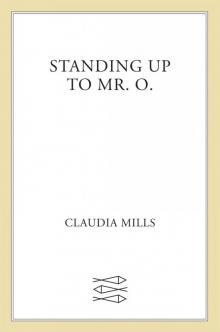 Standing Up to Mr. O.
Standing Up to Mr. O.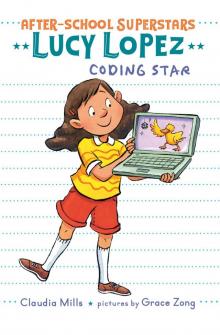 Lucy Lopez
Lucy Lopez Dinah Forever
Dinah Forever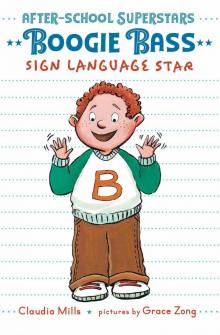 Boogie Bass, Sign Language Star
Boogie Bass, Sign Language Star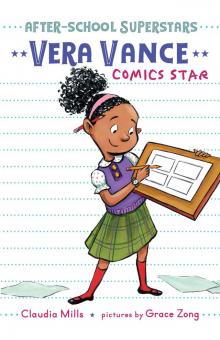 Vera Vance: Comics Star
Vera Vance: Comics Star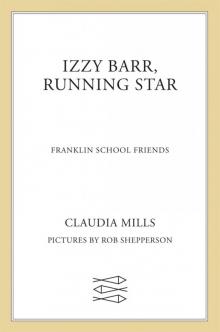 Izzy Barr, Running Star
Izzy Barr, Running Star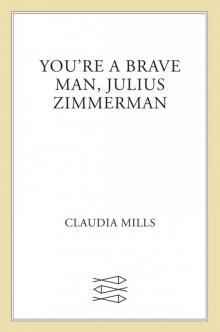 You're a Brave Man, Julius Zimmerman
You're a Brave Man, Julius Zimmerman Nixie Ness
Nixie Ness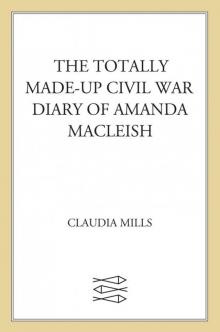 The Totally Made-up Civil War Diary of Amanda MacLeish
The Totally Made-up Civil War Diary of Amanda MacLeish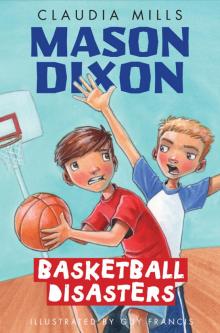 Basketball Disasters
Basketball Disasters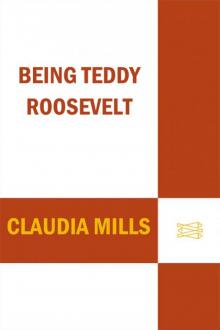 Being Teddy Roosevelt
Being Teddy Roosevelt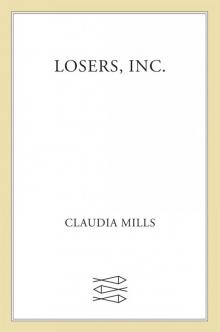 Losers, Inc.
Losers, Inc. The Trouble with Friends
The Trouble with Friends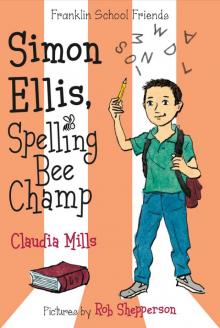 Simon Ellis, Spelling Bee Champ
Simon Ellis, Spelling Bee Champ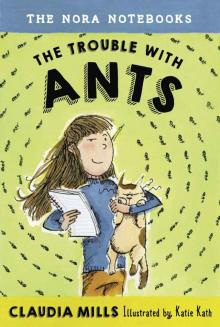 The Nora Notebooks, Book 1: The Trouble with Ants
The Nora Notebooks, Book 1: The Trouble with Ants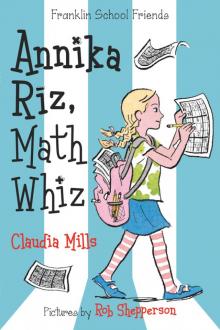 Annika Riz, Math Whiz
Annika Riz, Math Whiz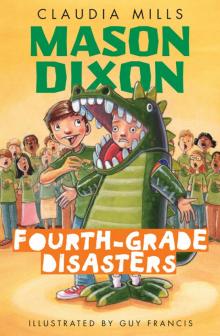 Fourth-Grade Disasters
Fourth-Grade Disasters Pet Disasters
Pet Disasters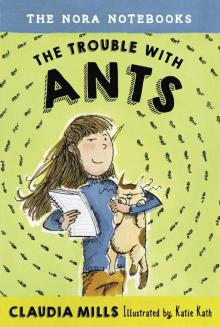 The Trouble with Ants
The Trouble with Ants Write This Down
Write This Down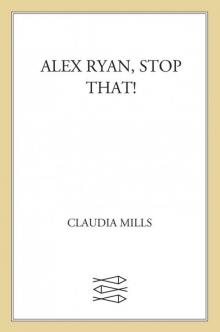 Alex Ryan, Stop That!
Alex Ryan, Stop That!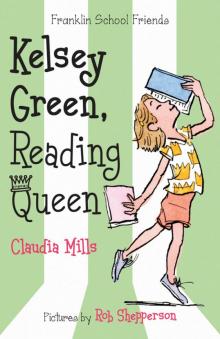 Kelsey Green, Reading Queen
Kelsey Green, Reading Queen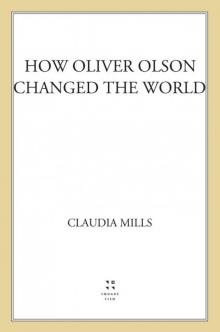 How Oliver Olson Changed the World
How Oliver Olson Changed the World Lizzie At Last
Lizzie At Last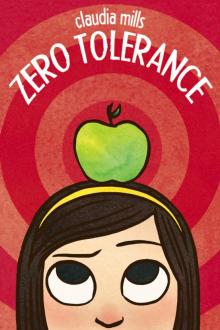 Zero Tolerance
Zero Tolerance The Nora Notebooks, Book 2
The Nora Notebooks, Book 2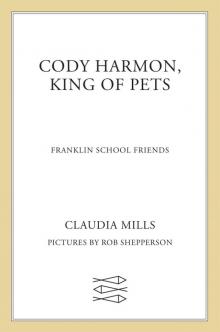 Cody Harmon, King of Pets
Cody Harmon, King of Pets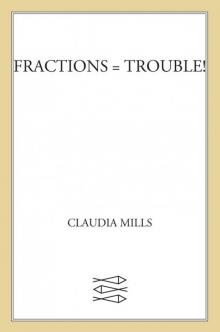 Fractions = Trouble!
Fractions = Trouble!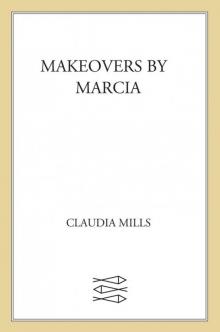 Makeovers by Marcia
Makeovers by Marcia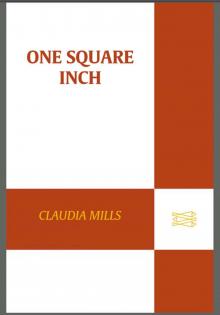 One Square Inch
One Square Inch